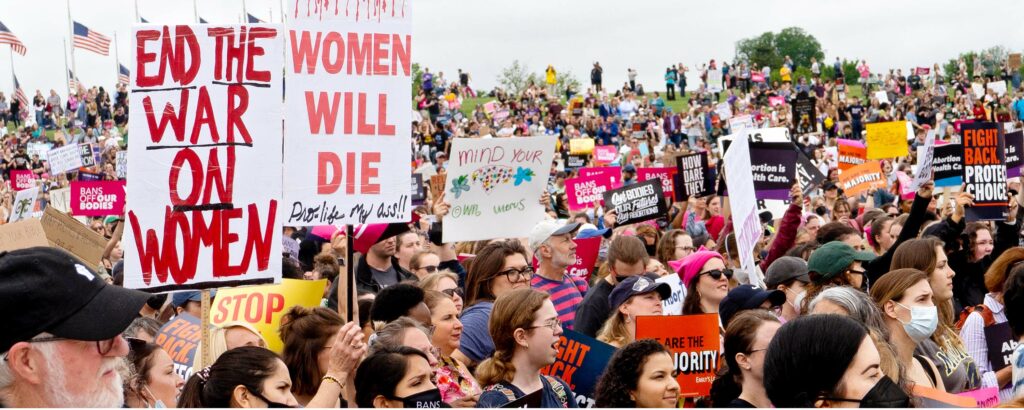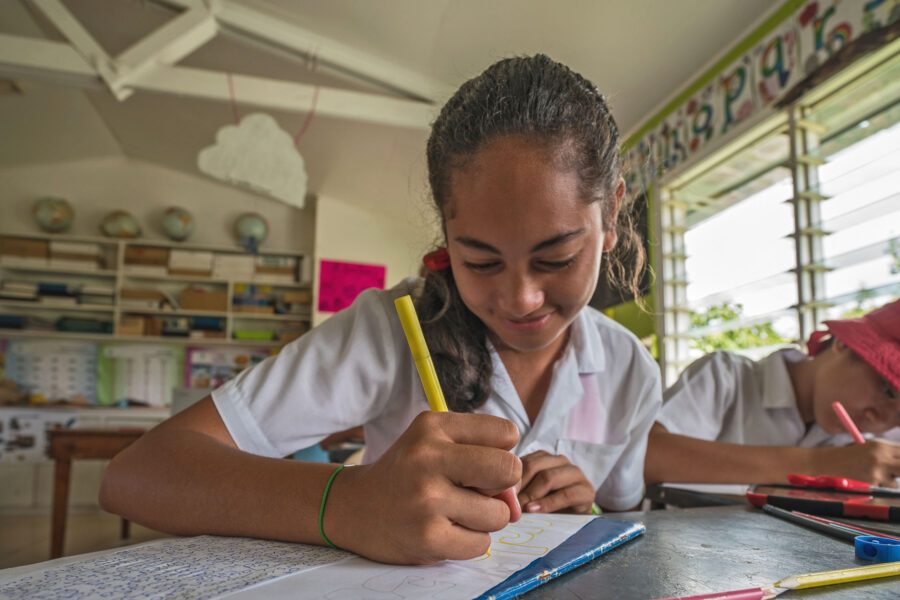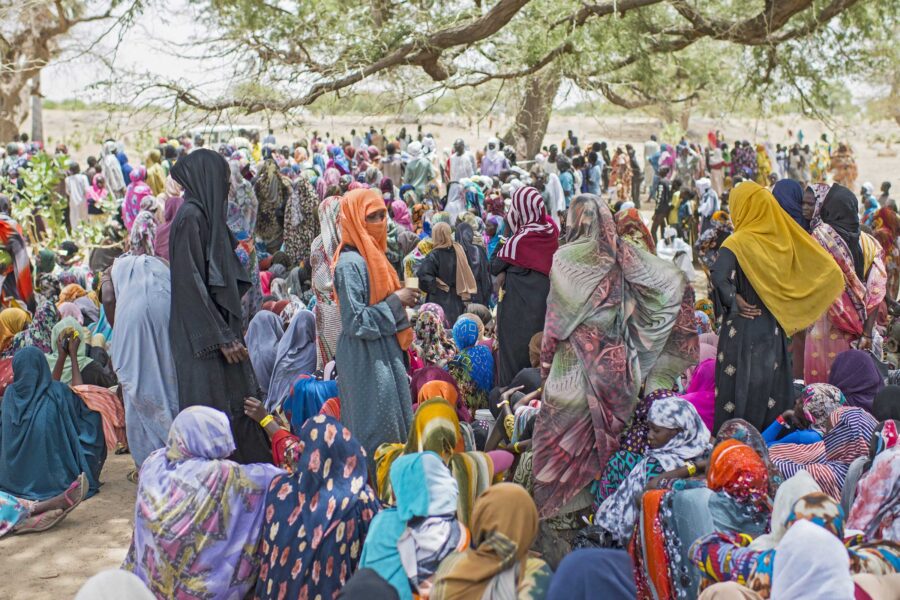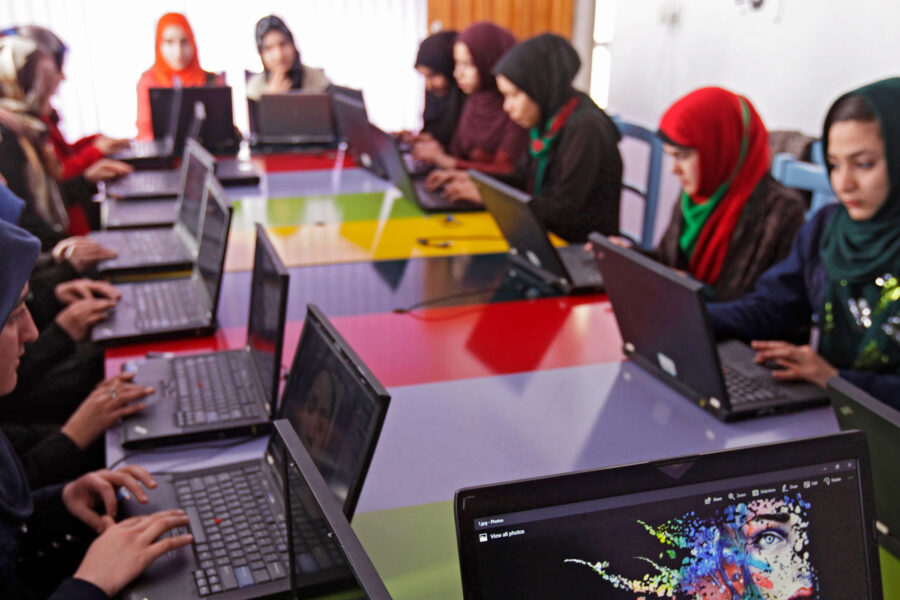Equality depends on reproductive rights
Campaigns to remove reproductive rights from women will prevent their full participation in society and the economy. Without women’s freedom to choose how and when to have children, there cannot be gender equality
Gender

In June 2022 the Supreme Court of the United States issued its decision in Dobbs v Jackson Women’s Health Organization, overturning Roe v Wade and Planned Parenthood of Southeastern Pennsylvania v Casey. The decision gave individual states the ability to ban or strictly limit access to reproductive rights. And, for the first time in the court’s history, it erased what Americans believe is a fundamental right.
Roe v Wade, decided in 1973, recognized the right of women to have an abortion, within certain limitations, and invalidated many state and federal laws that had barred women’s access to this important healthcare procedure. The radical Supreme Court that overturned Roe had already allowed a system of bounty hunting to impede women’s access to abortion in Texas, empowering anti-abortion zealots to file civil lawsuits against abortion providers and anyone who might help a woman get medical help for an unwanted or unhealthy pregnancy.
The Dobbs case represents a massive setback for women’s healthcare, and for their equal status in society. In many states that have quickly adopted or begun to enforce anti-abortion laws, clinics have closed and women who had appointments have been turned away. Some 26 states have anti-abortion laws that could go into effect, endangering women’s health in more than half of the US. In other states where abortion remains legal, clinics are overwhelmed from the demand from women who cross state lines to get a necessary procedure – for those who can afford the additional cost, time, and inconvenience, and who have personal circumstances and jobs that allow them to be away. But for many American women, that is not the case. Denying women the right to make critical decisions about how and when to have children reduces their autonomy and equal personhood, affects their ability to thrive economically, and harms their families and communities.
In its 17 Sustainable Development Goals (SDGs), the UN has recognized that efforts to end poverty must involve strategies that address “health and education, reduce inequality, and spur economic growth – all while tackling climate change and working to preserve our oceans and forests.” Women’s sexual and reproductive health is central to this vision. As the SDGs recognize:
“Women’s sexual and reproductive health is related to multiple human rights, including the right to life, the right to be free from torture, the right to health, the right to privacy, the right to education, and the prohibition of discrimination. The Committee on Economic, Social and Cultural Rights (CESCR) and the Committee on the Elimination of Discrimination against Women (CEDAW) have both clearly indicated that women’s right to health includes their sexual and reproductive health.”
To effectively fulfill their obligation to women’s rights, therefore, states must ensure that women have real and effective access to healthcare providers. This means:
- there must be adequate numbers of such providers
- they must offer their services without discrimination
- they must be located in places where they are accessible
- they must be affordable
- their quality must be sufficient to provide safe and effective care
After Dobbs, for many women in America, none of these factors is being fulfilled. The US now stands in clear violation of multiple UN treaties and directives. These include:
- CEDAW article 16, which demands that women be able to decide ”freely and responsibly on the number and spacing of their children and to have access to the information, education and means to enable them to exercise these rights”
- CEDAW article 10, regarding access to education, also specifies that women’s right to education includes access to “information and advice on family planning”
- many other provisions that demand that women be able to control their own sexuality and childbearing and that prioritize maternal health
Those opposed to women’s rights often frame abortion as a “culture war” issue, which does not bear on critical political debates about economic prosperity and wealth inequality. In reality, abortion is an essential component of economic progress, without which women – and their families – are consigned to precarity and often poverty. Without the ability to control fertility, women suffer from unfair pay, unequal social power, and higher burdens in the household.
However, Justice Samuel Alito in Dobbs contemptuously denied that abortion is an economic necessity. Indeed, he wrote in the leaked opinion that this “form of reliance depends on an empirical question that is hard for anyone – and in particular, for a court – to assess, namely the effect of the abortion right on society and in particular on the lives of women.” As with much of the decision, this statement is just wrong. Not only have many scholars analyzed the economic impact of abortion, but in the Dobbs case itself, over 100 economists filed an amicus brief detailing the deleterious consequences of the denial of the abortion right. These include:
- a higher chance of being in poverty
- a lower chance of full-time employment
- loss of promotion opportunities
- years’ long danger of higher debts and financial precarity
Other data establishes that states with access to abortion have lower teen births and marriages and better maternal health outcomes. Currently, the US has the poorest record for maternal mortality, especially for Black women, among similarly wealthy countries. Alito and the rest of the Supreme Court majority chose to ignore the evidence.
So what can we do? Although the Declaration of Independence asserted that “all men are created equal,” the US Constitution made no such statement. Indeed, the original text made specific accommodations for the institution of slavery. While the US Constitution has been amended subsequently to guarantee “equal protection of the laws” and provide the franchise to women, it still falls far short in explicitly protecting fundamental rights and liberties for women, minorities, and other underrepresented groups, like LGBTQ+ people.
And the Dobbs decision emphatically illustrates that we cannot depend on the Supreme Court’s adhering to longstanding precedent regarding unenumerated rights. Short of amending the Constitution, a difficult and time-consuming process, we must turn to other approaches, including using international tribunals to argue that the US is in violation of core human rights dictates. Most importantly, however, is the engagement in domestic politics that will be essential to near-term victories – and, crucially, to women’s health and equal status in society. Just as the elections in November 2022 demonstrated that Americans are not in agreement with – indeed, angrily reject – the Supreme Court’s vision of our Constitution, we must continue to fight this battle. With election victories in statehouses, Americans can undo harmful state laws and enhance current protections where they exist. They can elect state judges who see state constitutional protections as more expansive than those envisioned by the US Supreme Court. And Americans can elect a president and a Congress that will enshrine abortion rights in federal law, including providing health insurance coverage for poor women who otherwise cannot afford an abortion.
A sustainable future depends on women’s equality, which in turn requires recognizing women as autonomous actors. Reproductive rights and healthcare, freedom from discrimination, access to education and jobs, a safe and clean environment – all these rights are intertwined, reinforcing, and necessary for a livable world. That’s what we are fighting for.





